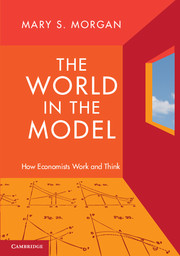Crossref Citations
This Book has been
cited by the following publications. This list is generated based on data provided by Crossref.
Morgan, Mary S.
2010.
How Well Do Facts Travel?.
p.
3.
Hoover, Kevin D.
2012.
The Role of Hypothesis Testing in the Molding of Econometric Models.
SSRN Electronic Journal,
Miller, Peter
and
Power, Michael
2013.
Accounting, Organizing, and Economizing: Connecting Accounting Research and Organization Theory.
Academy of Management Annals,
Vol. 7,
Issue. 1,
p.
557.
Marchionni, Caterina
2013.
Playing with networks: how economists explain.
European Journal for Philosophy of Science,
Vol. 3,
Issue. 3,
p.
331.
Henriksen, Lasse F.
2013.
Economic models as devices of policy change: Policy paradigms, paradigm shift, and performativity.
Regulation & Governance,
Vol. 7,
Issue. 4,
p.
481.
Mizohata, Sachie
and
Jadoul, Raynald
2013.
Towards International and Interdisciplinary Research Collaboration for the Measurements of Quality of Life.
Social Indicators Research,
Vol. 111,
Issue. 3,
p.
683.
Miller, Peter
and
Power, Michael
2013.
Accounting, Organizing, and Economizing: Connecting Accounting Research and Organization Theory.
Academy of Management Annals,
Vol. 7,
Issue. 1,
p.
557.
Halsmayer, Verena
and
Hoover, Kevin D.
2013.
Solow's Harrod: Transforming Cyclical Dynamics into a Model of Long-Run Growth.
SSRN Electronic Journal,
Kullman, Kim
2013.
Geographies of Experiment/Experimental Geographies: A Rough Guide.
Geography Compass,
Vol. 7,
Issue. 12,
p.
879.
Mansnerus, Erika
2013.
Pandemics and Emerging Infectious Diseases.
p.
110.
Mansnerus, Erika
2013.
Using model‐based evidence in the governance of pandemics.
Sociology of Health & Illness,
Vol. 35,
Issue. 2,
p.
280.
Callebaut, Werner
2013.
Naturalizing Theorizing: Beyond a Theory of Biological Theories.
Biological Theory,
Vol. 7,
Issue. 4,
p.
413.
Gunawardena, Jeremy
Kellogg, Doug
and
Lippincott-Schwartz, Jennifer
2014.
Beware the tail that wags the dog: informal and formal models in biology.
Molecular Biology of the Cell,
Vol. 25,
Issue. 22,
p.
3441.
Renwick, Chris
2014.
Response to Stephen T. Casper and Steve Fuller.
Philosophy of the Social Sciences,
Vol. 44,
Issue. 4,
p.
515.
Halsmayer, Verena
2014.
From Long-Run Utopia to Technical Expertise: Solow's Growth Model as a Multipurpose Design.
SSRN Electronic Journal,
Thomas, William
2014.
Decisions and Dynamics: Postwar Theoretical Problems and the MIT Style of Economics.
History of Political Economy,
Vol. 46,
Issue. suppl_1,
p.
295.
Johnson, Kirk D.
Medema, Steven G.
and
Samuels, Warren J.
2014.
The 8th Duke of Argyll, the Economics of Land Tenancy, and Stigler's "Coase Theorem".
HISTORY OF ECONOMIC THOUGHT AND POLICY,
p.
5.
Wansleben, Leon
2014.
Consistent Forecasting vs. Anchoring of Market Stories: Two Cultures of Modeling and Model Use in a Bank.
Science in Context,
Vol. 27,
Issue. 4,
p.
605.
Takami, Norikazu
2014.
MODELS AND MATHEMATICS: HOW PIGOU CAME TO ADOPT THE IS-LM-MODEL REASONING.
Journal of the History of Economic Thought,
Vol. 36,
Issue. 2,
p.
169.
Tanweer Ali, Dr
and
Hardt, Lukasz
2014.
Metaphors as research tools in economics.
On the Horizon,
Vol. 22,
Issue. 4,
p.
256.





